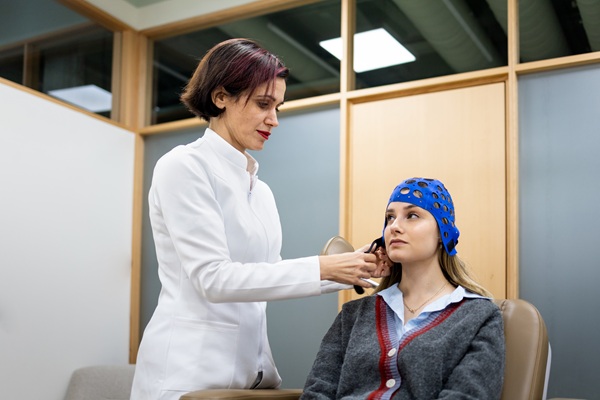Depression Treatment Options From a Psychiatrist

Since no two cases of depression are alike, depression treatment differs from person to person. However, if a patient's depression results from a chemical imbalance in the brain, they can benefit from seeing a psychiatrist. This professional treats mental illness from a medical standpoint and can prescribe medications and other treatments to help people overcome depression or manage their symptoms.
What is a psychiatrist?
A psychiatrist is a medical doctor that specializes in treating those with mental health issues and behavioral conditions. They complete undergrad, medical school, and then a residency program in psychiatry. Like a psychologist, they diagnose and treat mental health disorders. However, unlike a psychologist, whose main approach to treatment involves talk therapy, a psychiatrist treats depression from more of a physical standpoint. In addition, they tend to focus on using medication to fix chemical imbalances in the brain.
How a psychiatrist approaches depression treatment
The first thing a psychiatrist will do is get a patient's medical and mental health history. In addition, the doctor may ask detailed questions about the patient's family history of mental health disorders since mental health issues can be hereditary. They will want to ensure no underlying physical cause for the patient's depression symptoms because many physical illnesses manifest symptoms similar to depression. The psychiatrist may order tests to rule these out before exploring medication for depression.
Treatment options for depression
If the psychiatrist determines the patient can benefit from medical treatment for depression, the next step is to select the right treatment. It can take a couple of tries to match the patient with the right form of treatment. The doctor will also want to ensure the medication does not cause severe side effects or interact poorly with other medications the patient is already taking. Here are some depression treatments a psychiatrist may offer.
Oral antidepressant medication
Antidepressants are probably the most frequently prescribed depression treatment. There are several medications the patient can take orally in a pill to help alleviate the symptoms of depression. Most antidepressants take a month or so to start working, and the doctor may need to adjust the dose or switch and add medications. Popular antidepressants include selective serotonin reuptake inhibitors (SSRIs) such as fluoxetine (Prozac) and serotonin and norepinephrine reuptake inhibitors (SNRIs) such as venlafaxine (Effexor XR). The patient should continue to have regular appointments with the psychiatrist to ensure the medication works as it should.
Ketamine therapy
When conventional therapies such as antidepressants fail, a patient is said to have treatment-resistant depression. Ketamine therapy is a newer treatment that shows promise in treating treatment-resistant depression. Ketamine is a drug used in anesthesia that is also used illegally as a recreational drug. Because of its reputation as a recreational drug, it is not recommended for patients with addiction issues.
Transcranial magnetic stimulations (TMS)
Also recommended for treatment-resistant depression, TMS is a noninvasive brain stimulation that uses magnetic pulses to stimulate nerve cells. The key advantage of this form of treatment is that it is free of the side effects that come with ketamine and traditional antidepressants. However, TMS is not for everyone and may not be recommended for those with seizure disorders or certain medical implants.
Seeking depression treatment from a psychiatrist
Depression can be a complex issue and usually calls for a multifaceted approach to treatment involving two or more therapies. A psychiatrist can help assess a patient's case and customize a treatment plan to alleviate their symptoms. If you are suffering from depression, we can help.
Request an appointment here:https://futurepsychsolutions.com or call Future Psych Solutions at (803) 335-5232 for an appointment in our Columbia office.
Check out what others are saying about our services on Yelp: Depression Treatment in Columbia, SC.
Recent Posts
Mental health plays a critical role in overall well-being, influencing thought patterns, emotional stability, and behavior. For those experiencing persistent challenges, a formal diagnosis can provide clarity and a structured approach to healing. With guidance from a psychiatrist, individuals can better understand their condition and begin a path toward long-term mental wellness.A mental health diagnosis…
Are you looking for a TMS doctor? A TMS doctor is one that offers Transcranial magnetic stimulation to treat patients with major depressive disorder, which is also called MDD or clinical depression. Every TMS doctor utilizes their own method of treatment and many practices under other titles such as that of a psychiatrist. Learning more…
Post-traumatic stress disorder (PTSD) is a mental health condition that can develop after experiencing or witnessing a traumatic event. PTSD treatment aims to reduce symptoms and help people function better in their daily lives. It also focuses on improving their overall health and well-being. PTSD often causes anxiety, flashbacks, and emotional distress, making effective treatment…
Everyone experiences occasional anxiety, but an anxiety disorder involves persistent, excessive worry and physical symptoms that can disrupt daily routines, relationships, and overall well-being. If left untreated, these symptoms can intensify, impacting mental and physical health. Seeking help from a psychiatrist can be a significant first step toward effectively managing anxiety disorder symptoms and getting…


